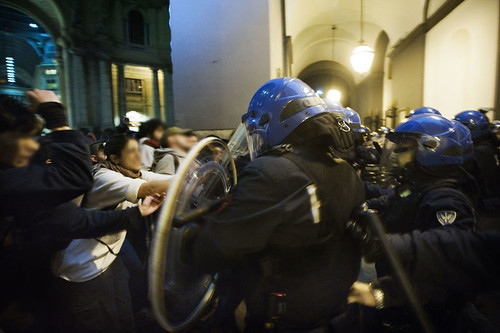Nós, os estudantes e trabalhadores precários da Europa, Tunísia, Japão, Estados Unidos, Canadá, México, Chile, Peru e Argentina,
reunimo-nos em Paris no fim-de-semana de 11 a 13 de Fevereiro de 2011 para discutir e organizar uma rede comum baseada nas nossas lutas comuns. Estudantes do Maghreb e da Gâmbia tentaram comparecer mas a França recusou-lhes a entrada. Reivindicamos a livre circulação de pessoas tal como a livre circulação das lutas.
De facto, nos últimos anos o nosso movimento assumiu a Europa como o espaço de conflitos contra a corporização da universidade e precariedade. Este encontro em Paris e os movimentos revolucionários ao longo do Mediterrâneo permitem-nos tomar um importante passo tanto em direcção a uma nova Europa contra a austeridade como às revoltas no Maghreb.
Somos uma geração que vive a precariedade como uma condição permanente: a universidade já não é um elevador de mobilidade social ascendente mas sim uma fábrica de precariedade. Nem a universidade é uma comunidade fechada: as nossas lutas pelo bem-estar, trabalho e a livre circulação de conhecimento e pessoas não param à sua porta.
A nossa necessidade por uma rede comum é baseada nas nossas lutas contra o Processo de Bolonha e contra os cortes na educação que a Europa está a usar como resposta à crise.
Sendo que o Estado e os interesses privados colaboram no processo de corporização da universidade, as nossas lutas não têm o objectivo de defender o
status quo. Os Governos pagam a fiança dos bancos e cortam na educação. Queremos fazer a nossa própria universidade – a universidade que vive nas nossas experiências de educação autónoma, pesquisa alternativa e escolas livres. É uma universidade gratuita, conduzida por estudantes, trabalhadores precários e migrantes, a universidade sem fronteiras.
Este fim-de-semana partilhámos e discutimos diferentes linguagens e práticas comuns de conflito: manifestações, ocupações e greves metropolitanas. Criámos e melhorámos as nossas reivindicações comuns: acesso gratuito à universidade contra os aumentos de propinas e custos de educação, nova acção social e direitos comuns contra a dívida e a financeirização das nossas vidas, e por uma educação baseada na cooperação contra a competição e hierarquias.
Com base nesta declaração comum:
- Apelamos a dias de acção comum e transnacional nos dias 24, 25 e 26 de Março de 2011: contra os bancos, sistema de dívida e medidas de austeridade, para a educação gratuita e a livre circulação de pessoas e conhecimento;
- Criaremos um diário comum de lutas e um meio autónomo de comunicação;
- Promoveremos uma grande caravana e encontro na Tunísia porque as lutas do Maghreb são as lutas que estamos a lutar aqui;
- Encontrar-nos-emos novamente em Londres em Junho;
- Faremos parte da contra-cimeira dos G8 em Dijon em Maio.
A lutar e a cooperar, este é o nosso Comunal de Paris!
 In the federal state of North Rhine-Westphalia (Germany) tuition fees were abolished again today, after being introduced in 2006!
In the federal state of North Rhine-Westphalia (Germany) tuition fees were abolished again today, after being introduced in 2006!














